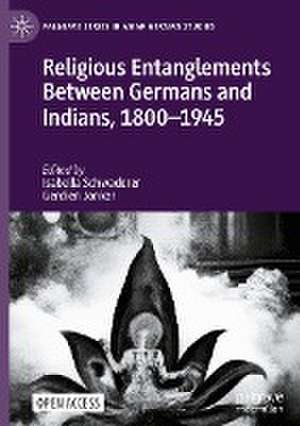Religious Entanglements Between Germans and Indians, 1800–1945: Palgrave Series in Asian German Studies
Editat de Isabella Schwaderer, Gerdien Jonkeren Limba Engleză Hardback – 9 ian 2024
Preț: 731.73 lei
Preț vechi: 892.35 lei
-18% Nou
Puncte Express: 1098
Preț estimativ în valută:
140.02€ • 147.24$ • 115.69£
140.02€ • 147.24$ • 115.69£
Carte tipărită la comandă
Livrare economică 17 aprilie-01 mai
Preluare comenzi: 021 569.72.76
Specificații
ISBN-13: 9783031403743
ISBN-10: 3031403746
Ilustrații: XVIII, 325 p. 29 illus.
Dimensiuni: 148 x 210 mm
Greutate: 0.56 kg
Ediția:1st ed. 2023
Editura: Springer Nature Switzerland
Colecția Palgrave Macmillan
Seria Palgrave Series in Asian German Studies
Locul publicării:Cham, Switzerland
ISBN-10: 3031403746
Ilustrații: XVIII, 325 p. 29 illus.
Dimensiuni: 148 x 210 mm
Greutate: 0.56 kg
Ediția:1st ed. 2023
Editura: Springer Nature Switzerland
Colecția Palgrave Macmillan
Seria Palgrave Series in Asian German Studies
Locul publicării:Cham, Switzerland
Cuprins
1 Introduction.- 2 ‘To Read in an Indian Way’ (Johann Gottfried Herder): Pre-Emergent Colonial Epistemologies in Indian–German Entanglements, Showcased in Protestant Theology c.1800.- 3 In Search of Purity: German-Speaking Vegetarians and the Lure of India (1833–1939).- 4 The Indian Challenge: Indology and New Conceptions of Christianity as ‘Religion’ at the End of the Nineteenth Century.- 5 Death and Transfiguration: Religion and Belonging in Felix Gotthelf’s Indian Opera Mahadeva (1910).- 6 The Indian Parsifal: Revisiting Felix Gotthelf’s Forgotten Opera Mahadeva.- 7 Modernism in Disguise? Neglected Aspects of the So-Called Revival of a Classical Indian Dance Form.- 8 ‘The Priestess of Hindu Dance’: Leila Sokhey’s Repertoire and Its Reception in the Netherlands and Germany (1927–38).- 9 Roaming Between East and West: In Search of Religious Ecstasy in the Interwar Period.- 10 Negotiating Germanness with Indian Religious History: Transfers of Academic Knowledge and Notions of völkisch Belief.- 11 Hakenkreuz, Swastika and Crescent: The Religious Factor in Nazi Cultural Politics Regarding India.- 12 Curating the Fragments of Local Modernities: The Menaka Digital Archive from the Perspective of Ongoing Research.
Notă biografică
Isabella Schwaderer teaches and researches at the University of Erfurt, Germany.
Gerdien Jonker does pure research at Friedrich-Alexander-University Erlangen-Nürnberg, Germany.
Gerdien Jonker does pure research at Friedrich-Alexander-University Erlangen-Nürnberg, Germany.
Textul de pe ultima copertă
Religion as a form of cultural expression constitutes a critical element in the relationship between Germany and India. The discovery of Indian traditions in Germany and re-interpretations of those traditions in India fueled not only new theological and philosophical explorations, but also extensive innovations in the fields of music, dance, bodily experience, and political intervention. Seeking to uncover the enfolding of colonial thought structures through presentations of the Self, while placing them in the context of global colonial value chains that connected the peripheries with the centre, this interdisciplinary volume addresses India through the lens of an entangled relationship. Adopting the position that the acceleration of communication, technical development, and colonisation locally triggered re-interpretations of the religious sphere, This volume takes a look at the period from 1800 to the end of National Socialism, tracing the strands of an Indo-Germanic religion inthe making as it goes along. A special emphasis is placed on the artistic expressions of religious experience including re-enactments of musical compositions and dance configurations, which were created to embody India in Germany.
Isabella Schwaderer teaches and researches at the University of Erfurt, Germany.
Gerdien Jonker does pure research at Friedrich-Alexander-University Erlangen-Nürnberg, Germany.
Caracteristici
Addresses India through the lens of an entangled relationship Takes into view the period that stretches from the start of the Kaiserreich to National Socialism Places special emphasis on the artistic expressions of religious experience This book is open access, which means that you have free and unlimited access









